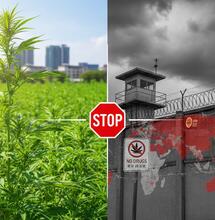What Are the Economic Effects of Legalization?

The number of legal states has been steadily growing over the last couple of years. Vermont, Rhode Island, Montana, New Jersey and New York are some of the states that launched legal sales last year. However, there are also states, like South Dakota and Oklahoma, that have opposed legalization, rejecting bills to regulate the legal retail of adult-use cannabis products. While legalization remains a dividing question nationwide, the main incentive that US states see to legalization is the substantial economic profits and benefits that come with it.
Tax Earnings
Legal cannabis generates enormous amounts of money in state coffers. The more significant chunk of money from marijuana tax collecting typically comes from recreational retail as states apply additional taxes on adult-use purchases.
For example, since the start of legalization more than ten years ago, cannabis taxes have brought in over $2.3 billion for the state of Colorado. 2021 was the most successful year thus far, with Colorado authorities collecting $423 million in marijuana tax revenue.
That same year, 2021, was also exceptionally lucrative for Washington, which collected $559 million in tax revenue, while Michigan amassed $246 million. California is the single state where the cannabis tax earnings are above $1 billion per year.
These are vast sums of money, and states repurpose them in various ways, usually to support essential local services such as transport, public safety and health, schools, social services, drug prevention programs, and natural resource management programs, among many others. The distribution of tax dollars typically goes directly to local counties that permit legal sales.
Employment Opportunities
Every state that sets up a legal cannabis market generates thousands of new jobs. With the increase of legalization, salaries are also becoming more competitive.
For example, Cannabis generated almost 12,000 jobs in Nevada by 2018, just two years into legalization. It's a significant leap in job opportunities in this field for a state that has a relatively small residential population.
Estimates suggest that more than 40,000 jobs in the cannabis sector will be available in Nevada by the end of next year, 2024. The worth in terms of labor income is expected to surpass $1.5 billion. In California, again, these figures are more prominent. The Golden State's total labor income is estimated to exceed $3.5 billion by 2024.
Producing and distributing marijuana products requires a workforce to handle farming, processing, and sales. Additionally, there are opportunities for ancillary industries supporting legal cannabis, such as tech and agriculture companies, software development, financial services, construction companies, and many more.
According to Vangst, the leading cannabis hiring platform, the highest-paying jobs between 2021 and 2022 were General Counsel ($150k - $225k), VP of Sales ($150k - $225k), and VP of Finance ($ 150k - $200k). The positions with the most significant salary increase year-over-year were Brand Managers (+56.9%) and Edible Specialists (42%).
Saving Money
The economic effects of legal cannabis are also reflected in the money that won't be allotted to law enforcement in those states where the plant has become regulated. The more states legalize cannabis, the less spend on law enforcement, court proceedings, and incarcerations.
The ultimate goal is to legalize cannabis federally. The sums spent for federal marijuana enforcement are in the billions every year. Once marijuana is removed from the list of Schedule I substances, it will result in fewer court cases and fewer incarcerations on cannabis-related allegations at the federal level.
There are already some significant developments too this end. With Biden's announcement last year to expedite a process and review the federal standing of marijuana, the number of cases involving simple possession has drastically dropped. Most charges now are for drug trafficking.
Product Prices
The more available cannabis becomes, the lower the cost for purchases. With more states embracing legal cannabis, it's more likely that prices will drop in general due to commoditization.
This may affect cannabis companies that want to maximize cannabis profits, and it can even impact tax earnings. However, lower prices are good for individual medical and recreational consumers who would save a dollar when purchasing cannabis goods.
It is still unknown what will happen when marijuana eventually becomes federally legal. Federal legalization would definitely involve more regulations and rules, likely crafted by federal agencies. These new rules might be about cultivation, sales, or any other industry segment, and they may result in various other legal and economic consequences, including pricing.












